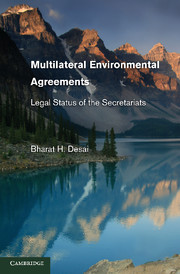5 - Legal Status
Published online by Cambridge University Press: 05 September 2013
Summary
Introduction
The practice of multilateral environmental regulation is quite diffused, highly fragmented, and “poorly coordinated.” It has effectively ushered the states into an era of institutionalized international cooperation. Because the marathon practice has assumed the form of a process – rather than a one-time affair – it poses a challenge for the sovereign states to remain constantly engaged. A series of factors seems to be responsible for nurturing this vibrant process. It comprises not only an institutionalized regulatory approach to address sectoral environmental issues but also a set of institutions that are thought to be necessary to ensure that contracting state parties realize the objectives of the specific sectoral regulatory process at work.
In fact, the institutional actors have been regarded as “critical forces in shaping ‘real world’ environmental governance systems.” Such intergovernmental institutional structures are pressed into service for a variety of purposes. Moreover, when a multilateral regulatory framework is put into place, it is built with its own set of institutional structures. This regulatory framework includes political bodies such as conference and meeting of the parties, scientific and technical bodies, funding mechanisms, and the secretariat. As compared to other institutional structures within a specific legal regime, the secretariat has become almost indispensable. It symbolizes a structural approach at work and is the most visible arm of the regulatory framework. The practice and procedures revolving around secretariat are largely governed by the international law of international institutions.
- Type
- Chapter
- Information
- Multilateral Environmental AgreementsLegal Status of the Secretariats, pp. 133 - 170Publisher: Cambridge University PressPrint publication year: 2010



